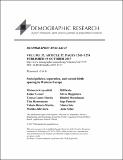Social policies, separation and second birth spacing in Western Europe
Abstract
Objective: This paper studies postseparation fertility behavior. The aim is to investigate whether, and if so how, separation affects second birth spacing in Western European countries. Methods: This analysis makes use of rich survey data from Belgium, France, Germany, Italy, Spain, and the United Kingdom, as well as from Finnish register data. We thus cover the behavior of a large proportion of the population of Western Europe. We also use descriptive measures, such as Kaplan‒Meier survival functions and cumulative incidence curves. In the multivariate analysis, we employ event history modeling to show how education relates to postseparation fertility behavior. Results: There are large differences in postseparation fertility behavior across European countries. For Spain and Italy, we find that only a negligibly small proportion of the population have a second child after separating from the other parent of the firstborn child. The countries with the highest proportion of second children with a new partner are the United Kingdom, Germany, and Finland. In all countries, separation after first birth leads to a sharp increase in the birth interval between first and second births. Contribution: Our study is a contribution to the demographic literature that aims at understanding birth spacing patterns in Western Europe. Furthermore, we draw attention to the role of postseparation policies in explaining country differences in fertility behavior in contemporary societies.
Citation
Kreyenfeld , M , Geisler , E , Castro Martin , T , Hannemann , T , Heintz-Martin , V , Jalovaara , M , Kulu , H , Meggiolaro , S , Mortelmans , D , Pasteels , I , Seiz , M & Solaz , A 2017 , ' Social policies, separation and second birth spacing in Western Europe ' , Demographic Research , vol. 37 , 37 , pp. 1245-1274 . https://doi.org/10.4054/DemRes.2017.37.37
Publication
Demographic Research
Status
Peer reviewed
ISSN
1435-9871Type
Journal article
Description
The research leading to these results received funding from the European Union’s Seventh Framework Programme (FP7/2007–2013) under grant agreement no. 320116 for the research project FamiliesAndSocieties. We also acknowledge funds from the Academy of Finland (decision number 275030 and 293103) and the German Science Foundation (KR 2855/3–1 and TR 457/7–1).Collections
Items in the St Andrews Research Repository are protected by copyright, with all rights reserved, unless otherwise indicated.

